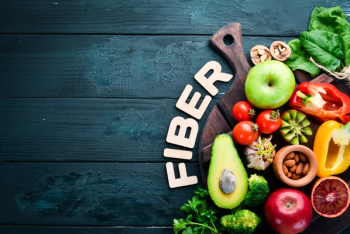
- Nutritional Outlook Vol. 27 No. 9
- Volume 27
- Issue 9
Power of nutrition in cardiac health
Insights from Dr. Heather Shenkman,vegan cardiologist and triathlete.
As an interventionist cardiologist and runner, I have witnessed firsthand the profound connection between what we eat and our heart health. Cardiac health is not only influenced by genetics and physical activity but also by nutrition. With the latest research continuously validating the role of plant-based diets, specific superfoods, and nutrients, it’s clear that what we put on our plate can shape the future of our heart.
At every stage of life, nutrition plays a crucial role in determining heart resilience and health. For parents, it’s worth establishing a heart-healthy diet for kids right from the beginning. Though it may not be easy because of peer pressure and the access to highly processed food, teaching kids early to like fruits, vegetables, whole grains, and healthy fats will lay the groundwork for a lifetime of cardiovascular protection.
In adulthood, maintaining a balance of nutrients is imperative to help reduce the risk of developing conditions like hypertension, high cholesterol, and atherosclerosis. A plant-based or Mediterranean diet, rich in fiber and antioxidants, has been shown to lower the risk of these conditions and promote overall cardiovascular health. As we age, heart function and vascular health can deteriorate naturally, but the right diet can slow this process. The key nutrients to look for in foods and also to add in the form of supplements includes omega-3 fatty acids, plant-based proteins, and vitamins.
For those who have already experienced heart disease or a cardiac event, nutrition becomes even more critical. Dietary changes can aid in recovery, reduce the risk of future complications, and help the heart remain strong throughout life. Plant-based diets, high in anti-inflammatory foods, can reduce the progression of heart disease and support the circulatory system’s ability to repair and adapt post-injury.
About Superfoods
There are certain superfoods that offer specific benefits to the heart, gut, and metabolism.These foods not only help to prevent heart disease but also help manage damage; here are my recommendations:
Beetroot: One of the most powerful superfoods for heart health, beetroot is rich in nitrates that convert to nitric oxide in the body. Nitric oxide helps to dilate blood vessels, improving blood flow and reducing blood pressure. A potent daily dose of beetroot, whether in a powder, juice form or as part of a meal, can help support optimal blood pressure and endurance during exercise—something I personally rely on for marathon training.
Leafy Greens: Kale, spinach, and other leafy greens are rich in nitrates, fiber, and antioxidants, making them a cornerstone of heart-healthy diets. Their high levels of potassium and magnesium also help regulate blood pressure. If you don’t know how to cook them, it’s easy to find these as salad options in every grocery store.
Berries: Blueberries, strawberries, and raspberries are packed with antioxidants called anthocyanins, which reduce oxidative stress and inflammation, key factors in the development of heart disease.
Nuts and Seeds: Rich in omega-3 fatty acids, walnuts, chia seeds, and flaxseeds support the reduction of LDL cholesterol levels while increasing HDL cholesterol, providing a protective benefit to the heart. I like to make chia seed pudding for breakfast. I simply combine almond or coconut milk with chia, and add berries on top.
Whole Grains: Oats, quinoa, and barley are fiber-rich foods that can help manage cholesterol levels. Soluble fiber helps absorb excess cholesterol in the digestive tract, preventing its reabsorption into the bloodstream. Oats can be used as a thickener in veggie soups.
The Role of Fiber, Prebiotics, and Probiotics
Digestive health is intrinsically linked to cardiovascular health, and fiber plays a crucial role in this relationship. Fiber not only helps manage cholesterol levels but also supports a healthy gut microbiome, which recent research suggests has far-reaching effects on inflammation and heart disease risk.
Incorporating prebiotics and probiotics into the diet has also emerged as an effective strategy for improving cardiovascular outcomes. One specific probiotic, Bacillus coagulans, helps balance gut bacteria, which in turn reduces systemic inflammation—a key driver of heart disease. I used this ingredient in a supplement I created called CardioFitMD.
Additionally, daily fiber intake from foods like beans, lentils, and whole grains can support metabolic health by stabilizing blood sugar levels, reducing the risk of insulin resistance, and promoting a healthy weight—all of which are critical for preventing heart disease and maintaining long-term cardiac health.
Keeping the Heart Strong Post-Diagnosis
For individuals who have already been diagnosed with heart disease or have experienced a cardiac event, nutritional intervention is a powerful tool. Transitioning to a plant-based diet has been shown to not only halt, but in some cases, reverse the progression of heart disease. A diet low in saturated fats, cholesterol, and processed foods, combined with regular physical activity, can drastically reduce the risk of future heart attacks and strokes.
Nutritional strategies include increasing the intake of anti-inflammatory foods, such as vegetables, fruits, nuts, and whole grains, while minimizing the consumption of processed sugars and trans fats. Adding daily supplements, like beetroot powder, can enhance blood flow and cardiovascular function, providing further protection against future heart issues.
Cardiovascular health is a long game and shaped by our daily nutritional choices. Embracing more plants, less animal-based products (red meat, animal skin, butter, cheese) and adding superfoods can transform your cardiovascular wellness, keeping your heart strong and resilient at every stage of life.
About the Author
Dr. Heather Shenkman is a board certified interventional cardiologist. She completed a six year program at Albany Medical College, graduating at the age of 23. She completed her residency at Henry Ford Hospital, cardiology fellowship at the University of Rochester, and interventional cardiology fellowship at the esteemed Tufts Medical Center in Boston. She is a member of the 1MD Nutrition Scientific Advisory Board.
Articles in this issue
about 1 year ago
Pushing protein limitsabout 1 year ago
Fiber forwardabout 1 year ago
Lively Liposomesabout 1 year ago
Big picture on stress managementabout 1 year ago
Advancements in infant nutritionNewsletter
From ingredient science to consumer trends, get the intel you need to stay competitive in the nutrition space—subscribe now to Nutritional Outlook.





